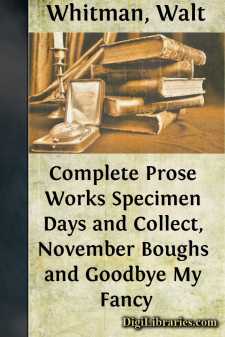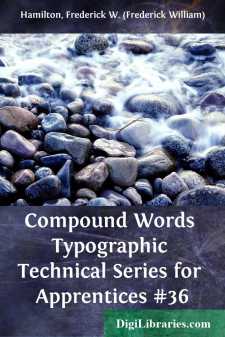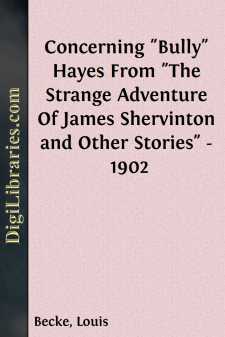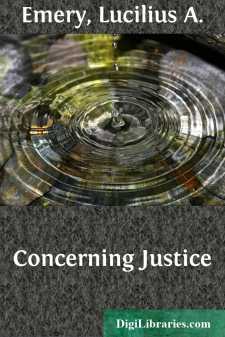Fiction
- Action & Adventure 180
- Biographical 15
- Christian 59
- Classics 6965
- Coming of Age 5
- Contemporary Women 3
- Erotica 8
- Espionage/Intrigue 12
- Fairy Tales, Folklore & Mythology 236
- Family Life 169
- Fantasy 117
- Gay 1
- General 596
- Ghost 32
- Historical 808
- Horror 43
- Humorous 160
- Jewish 25
- Legal 4
- Medical 22
- Mystery & Detective 315
- Political 49
- Psychological 41
- Religious 64
- Romance 159
- Sagas 11
- Science Fiction 730
- Sea Stories 113
- Short Stories (single author) 537
- Sports 10
- Suspense 1
- Technological 8
- Thrillers 2
- Urban Life 31
- Visionary & Metaphysical 1
- War & Military 173
- Westerns 199
Fiction Books
Sort by:
by:
Walt Whitman
A HAPPY HOUR'S COMMAND Down in the Woods, July 2d, 1882.-If I do it at all I must delay no longer. Incongruous and full of skips and jumps as is that huddle of diary-jottings, war-memoranda of 1862-'65, Nature-notes of 1877-'81, with Western and Canadian observations afterwards, all bundled up and tied by a big string, the resolution and indeed mandate comes to me this day, this...
more...
by:
Plutarch
Epicurus's great confidant and familiar, Colotes, set forth a book with this title to it, that according to the tenets of the other philosophers it is impossible to live. Now what occurred to me then to say against him, in the defence of those philosophers, hath been already put into writing by me. But since upon breaking up of our lecture several things have happened to be spoken afterwards in...
more...
INTRODUCTION The English language contains a great many words and phrases which are made up of two or more words combined or related in such a way as to form a new verbal phrase having a distinct meaning of its own and differing in meaning from the sum of the component words taken singly. Income and outgo, for example, have quite definite meanings related, it is true, to come and go and to in and out,...
more...
COMRADES In the late May evening the soul of summer had gone suddenly incarnate, but the old man, indifferent and petulant, thrashed upon his bed. He was not used to being ill, and found no consolations in weather. Flowers regarded him observantly—one might have said critically—from the tables, the bureau, the window-sills: tulips, fleurs-de-lis, pansies, peonies, and late lilacs, for he had a...
more...
by:
Frank V. Webster
CHAPTER I AN EXCITING ESCAPE Twilight was settling on the land. The forms of trees and houses loomed big and black, their sharp outlines suggesting fanciful forms to the minds of two boys hurrying along the road which like a ribbon wound In and out among the low hills surrounding the town of Bramley, in south-western Ohio. As the darkness increased lights began to twinkle from the windows of the...
more...
by:
Louis Becke
"BULLY" HAYES! Oh, halcyon days of the sixties and seventies, when the Pacific was not, as now, patrolled by men-of-war from lonely Pylstaart, in the Friendlies, to the low-lying far-away Marshalls and the coral lagoons of the north-west; when the Queensland schooners ran full "nigger" cargoes to Bundaberg, Maryborough, and Port Mackay; when the Government agents, drunk nine days out of...
more...
INTRODUCTION"EHA"Edward Hamilton Aitken, the author of the following sketches, was well known to the present generation of Anglo-Indians, by his pen-name of Eha, as an accurate and amusing writer on natural history subjects. Those who were privileged to know him intimately, as the writer of this sketch did, knew him as a Christian gentleman of singular simplicity and modesty and great charm of...
more...
CHAPTER ICONCERNING THE "PRETTY LADY"She was such a Pretty Lady, and gentle withal; so quiet and eminently ladylike in her behavior, and yet dignified and haughtily reserved as a duchess. Still it is better, under certain circumstances, to be a cat than to be a duchess. And no duchess of the realm ever had more faithful retainers or half so abject subjects. Do not tell me that cats never love...
more...
CHAPTER I THE PROBLEM STATED. THEORIES AS TO THE SOURCE OF JUSTICE. DEFINITIONS OF JUSTICE For centuries now much has been written and proclaimed concerning justice and today the word seems to be more than ever upon the lips of men, more than ever used, but not always appositely, in arguments for proposed political action. Hence it may not be inappropriate to the time and occasion to venture, not...
more...
by:
Ann Wilson
A A: (Imperial English): The neutral-animate pronoun. Emperor Chang disliked the fact that there was no good Standard English pronoun that referred to a single individual of unknown sex, or where sex was immaterial, so he made use of the Celtic "a", often written with an accent mark (á) by those who use Standard, to distinguish it from the indefinite article (@ is sometimes used when the...
more...











